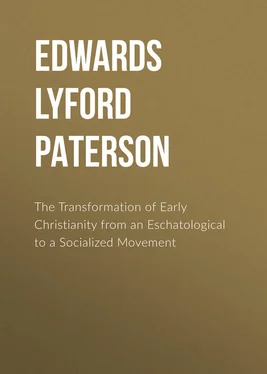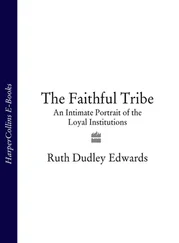Lyford Edwards - The Transformation of Early Christianity from an Eschatological to a Socialized Movement
Здесь есть возможность читать онлайн «Lyford Edwards - The Transformation of Early Christianity from an Eschatological to a Socialized Movement» — ознакомительный отрывок электронной книги совершенно бесплатно, а после прочтения отрывка купить полную версию. В некоторых случаях можно слушать аудио, скачать через торрент в формате fb2 и присутствует краткое содержание. Жанр: foreign_religion, foreign_antique, foreign_prose, на английском языке. Описание произведения, (предисловие) а так же отзывы посетителей доступны на портале библиотеки ЛибКат.
- Название:The Transformation of Early Christianity from an Eschatological to a Socialized Movement
- Автор:
- Жанр:
- Год:неизвестен
- ISBN:нет данных
- Рейтинг книги:4 / 5. Голосов: 1
-
Избранное:Добавить в избранное
- Отзывы:
-
Ваша оценка:
- 80
- 1
- 2
- 3
- 4
- 5
The Transformation of Early Christianity from an Eschatological to a Socialized Movement: краткое содержание, описание и аннотация
Предлагаем к чтению аннотацию, описание, краткое содержание или предисловие (зависит от того, что написал сам автор книги «The Transformation of Early Christianity from an Eschatological to a Socialized Movement»). Если вы не нашли необходимую информацию о книге — напишите в комментариях, мы постараемся отыскать её.
The Transformation of Early Christianity from an Eschatological to a Socialized Movement — читать онлайн ознакомительный отрывок
Ниже представлен текст книги, разбитый по страницам. Система сохранения места последней прочитанной страницы, позволяет с удобством читать онлайн бесплатно книгу «The Transformation of Early Christianity from an Eschatological to a Socialized Movement», без необходимости каждый раз заново искать на чём Вы остановились. Поставьте закладку, и сможете в любой момент перейти на страницу, на которой закончили чтение.
Интервал:
Закладка:
The above sketch summarizes essentially all that has survived about the Chiliasm of the early Church. The Chiliastic passages in the Church literature up to and including Augustine, though rather widely scattered, are not great in bulk. If printed together they would make only a moderate sized pamphlet. But their importance is by no means to be measured by their size. Chiliasm, better than any other movement of the early period, serves as a standard for measuring the degree of the socialization of Christianity. It comprises the only body of doctrine which passed from practically universal acceptance to practically universal repudiation during the period when the Church changed from a small esoteric cult to a dominant factor of society. Considered from this point of view, the causes of the decline of Chiliasm possess a historical importance out of all proportion to the importance of Chiliasm itself. More than any other religious movement of the time Chiliasm was free from the direct pressure of distinctly religious influences. Its declension was more nearly a case of unconscious social and psychological determinism than any other contemporary theological phenomenon. Its chief supporters and opponents are not to be regarded so much as factors in its history, as points where the socializing forces operating in the early Church become for the moment visible.
Certain facts stand out even in the short epitome we have given. Chiliasm never became powerful in the great cities. It survived longest and was most popular in regions 34 34 E.g., Lydia, Phrygia, The Thebaid.
comparatively cut off from the great centers of civilization. Hellenizing influences were unfavorable to it, Romanizing influences indifferent to it.
The reasons for this are numerous and most of them have been treated sufficiently by previous investigators, but in the writer's judgment certain other important influences have been either slighted or entirely ignored. We shall consider one or two.
The supremely important fact in early Christian history is the development of the concept of "The Church" as an independent, self-existing, metaphysical entity. This metaphysical entity was conceived as embodying itself in the whole body of believers; living, dead, and yet to be born. The entity was eternal, indestructible, and in its essence immutable. Although partially embodied in a visible society its essential being was conceived as independently sustained in the nature of the universe. It was an idea in the strict Platonic sense. No concept like this is found in the contemporary pagan cults. Even the Jewish concept of the 'chosen people' is ethnic or national rather than purely religious and it has no tinge of that metaphysical existence which is the most notable element in the Catholic concept of the Church. The elements out of which 'the Church' concept was constructed were four: two Roman, one Greek and one Hebrew. The Roman lawyers, in the process of fitting a municipal legal system to a world empire, evolved the twin legal entities, 'state' and 'sovereignty.' These entities were endowed with divers qualities; eternity, immutability, etc., but especially with the quality of having existential reality apart from any individual embodiment thereof. Greek philosophy contributed the idea of the Cosmopolis, the ideal world-city in which the fullest development of human personality was to be attained. This concept was as purely metaphysical as the self-existing, absolute 'state' of the Roman law, but unlike the Roman concept it had no concrete existence. The Jewish contribution was that of the 'chosen people,' 'the elect nation.' These four concepts were transferred from their original loci to the Christian society. The fact that all of these concepts were combined and centered on the same social group and the further fact that each of these concepts supplemented the others in a remarkable way resulted in the formation of one of the most powerful ideas in religious history.
This Church concept, thus built up, had already become widespread in the time of Augustine and this fact helps us to understand the otherwise unintelligible success of that saint in combatting Chiliasm. The real truth is seen to be that Augustine's ideas succeeded because they were not peculiarly his at all – they already existed, implicitly but really, in the mind of the generation which he addressed. The elements of the concept 'the Church' being what they were, Augustine's explanation of, or rather abolition of, Chiliasm follows of inevitable logical and intellectual necessity. It was the genius of Augustine that he recognized and gave formulated, concrete expression to this accomplished fact and it is no derogation of his genius to say that had he never existed the accomplished fact would eventually have been given expression to by some one else.
Another little considered element in Chiliasm is that of masochism, and sadism, the two being merely the opposite sides of the same psychical phenomenon. This element is found more or less prominently in all the Chiliastic literature from the early fragment of Papias to the elaborate discussions of Augustine. The masochistic phenomena are the most remarkable characteristics of the early martyrdoms and if a collection were made of the masochistic passages of the writings of the Chiliasts, the bulk of them would be as great as that of the Chiliastic passages proper.
It is necessary to bear in mind that masochism necessarily, in any advanced society, disguises itself under some socially acceptable form of sentiment or emotion, i.e., admiration for the constancy of the confessors or martyrs, suffering as a mark of the true Church, etc. It is always associated with the reality or idea of struggle. It has a high 'survival value' in the struggle for existence by heightening individual power in conflict. Like other human characteristics it is seen most clearly in the exaggerated form it assumes in its crowd manifestations. Its most evident expression is in the 'mob mind.' Our problem, then, is to discover how the declension of Chiliasm is to be explained by the transfer of the masochistic element in it to other vehicles of expression. The masochistic element was a vital factor in Chiliasm; without it almost the whole force of 'the thousand years reign of the saints' is lost. The explanation of the transfer is difficult. Undoubtedly some of the masochistic values of Chiliasm were taken over by the various, previously mentioned concepts that combined to make up the idea of the Catholic Church. 'Extra ecclesia nulla salus' accounts for part of the phenomena previously expressed Chiliastically. It is notable in this connection that there is no word of Chiliasm in Cyprian. But a more important transfer was that which took place in the course of the development of the doctrine of purgatory. It may perhaps seem incongruous to say that purgatory took over the values of the millennium and from the point of view of formal theology it is so. But the only point we are trying to make here, namely, the fundamental fact of the expression of masochistic impulses, is as evidently shown in the purgatory as in the millennium concept. The desire for a heightened sense of self-realization, a richer content of experience, is the cause of the appearance of both concepts and they are closely allied psychologically. This fact comes out in the large part played by the Chiliasts in the evolution of the purgatory concept. 35 35 Clem. Alex. Paed., iii, Strom. VII. Origen, Hom. on Num., XXV. Hom. on Ps. XXVI. Lactantius, VII, 20.
What we find here is a concurrent declension of Chiliasm and development of purgatory. For about two centuries the two concepts existed side by side; then the superior social value of purgatory asserting itself, that doctrine gradually took over the masochistic values of Chiliasm; the supersession of the later being rendered thereby more rapid and easy.
Интервал:
Закладка:
Похожие книги на «The Transformation of Early Christianity from an Eschatological to a Socialized Movement»
Представляем Вашему вниманию похожие книги на «The Transformation of Early Christianity from an Eschatological to a Socialized Movement» списком для выбора. Мы отобрали схожую по названию и смыслу литературу в надежде предоставить читателям больше вариантов отыскать новые, интересные, ещё непрочитанные произведения.
Обсуждение, отзывы о книге «The Transformation of Early Christianity from an Eschatological to a Socialized Movement» и просто собственные мнения читателей. Оставьте ваши комментарии, напишите, что Вы думаете о произведении, его смысле или главных героях. Укажите что конкретно понравилось, а что нет, и почему Вы так считаете.












